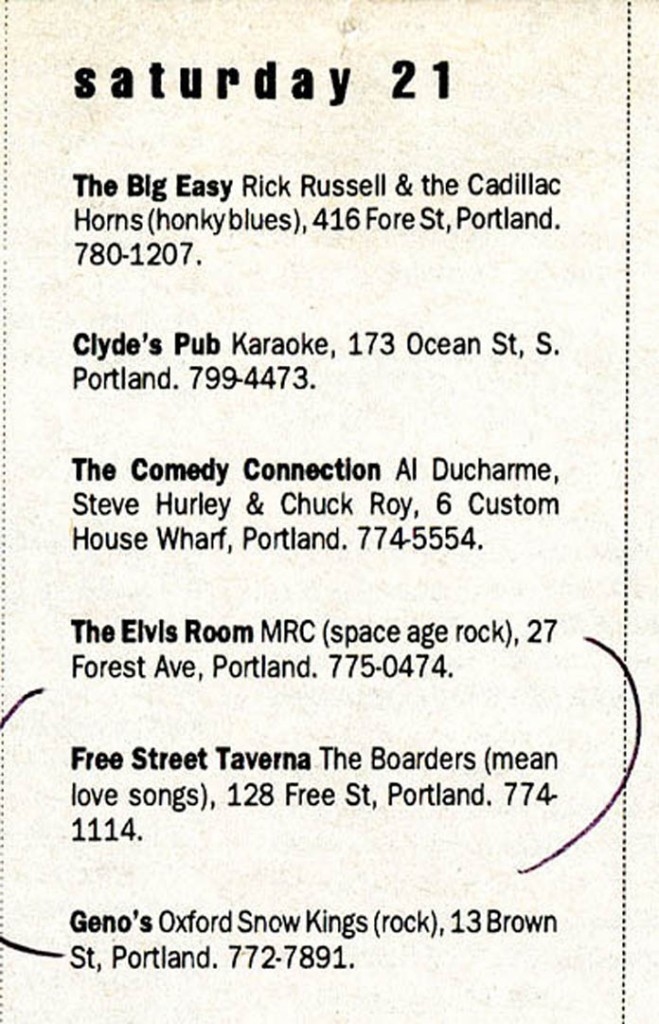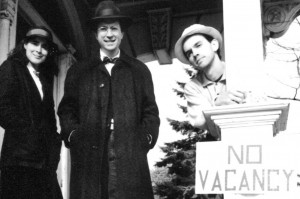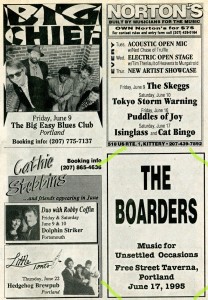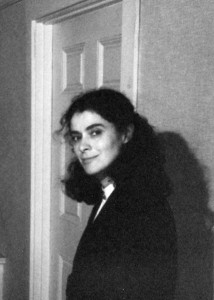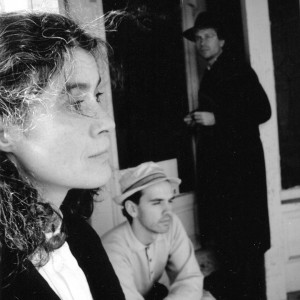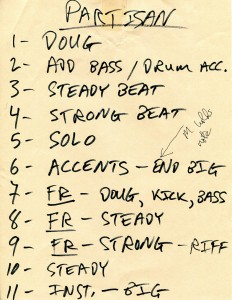The Boarders: Taverna Nights
We want these archives, whether digital or physical, to point back to the very real experience we had, or, just as importantly, to give us insight into someone else’s experience. Silicon Valley tech culture expert Paul Philleo calls these mementos “anchors of memory.”
— From Our Virtual Shadow by Damon Brown
Hoist these anchors of memory and sail away on the catchy riptide of the famous Boarders!
Standing on stage at the Free Street Taverna,
you faced a long, narrow room that had a single window and was therefore dim much of the time. The bar was on the left. There was a video gambling
gizmo on the bar and dollar bills stapled to the ceiling joists.
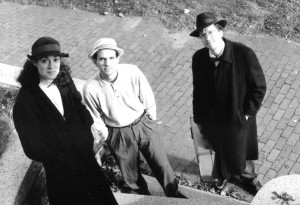
The Boarders in a 1994 publicity image by Jeff Stanton. From left: Gretchen Schaefer, Jonathan Nichols-Pethick, Doug Hubley. Hubley Archives.
Bassist Gretchen Schaefer occupied the left side of the stage. Drummer Jonathan Nichols-Pethick set up in the center. I was at stage right. This was the mid-1990s in Portland, Maine, and we were the Boarders.
The space was intimate. I remember the faces of friends who frequently came to hear the Boarders at the Taverna: Jeff Stanton and Alden Bodwell, who helped with load-in and setup; Barbie Weed and Tracey Mousseau; former bandmates Ken Reynolds and Steve Chapman, and Steve’s wife, Jeri Chapman.
Sometimes the nights were long and I could see our friends propping themselves up above the rising waters of fatigue. We were into our 40s.
We didn’t play the Taverna till the Boarders were a few months along. Instead, our formal debut was outdoors at the Congress Square Festival on a brutally windy Saturday in September 1994. (That June, with Gretchen away visiting family, Jonathan and I did a couple of songs as the Boarders at Brian Ború when Jonathan’s friend Steve Gerlach invited us to share his stage time. On the sunny deck, I played acoustic guitar and Jon thumped a green suitcase.)
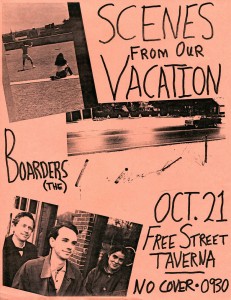
Our poster for that October 1995 Taverna date. The second image from the top shows the fence at Gretchen’s and my house after a motorist flattened it. I propped it back up and the insurance money paid for a trip to Montreal (top). Hubley Archives.
A restaurant as well as bar, the Taverna was a happening place in those early days of the “Portland Arts District” — a concept that I mocked at the time but that now seems to have taken hold.
Taverna proprietor Peter Kostopoulos had the Arts District spirit. He booked adventurous bands, hung local artwork on the brick walls and presented bohemian activities like poetry nights. (We still recall an earnest young blonde from Texas who read poems about wolves and about being naked, pronounced “woofs” and “nekkid.”) It was a scene, man!
The Kostopoulos family had once run the Zapion Taverna, a Greek restaurant on Congress Street, and still run the Good Table in Cape Elizabeth. There were Greek dishes on the Free Street Taverna menu.
The Taverna building belonged to the family. From 1968 until 1974, Peter’s parents, Tony and Sylvia, had International Cargo there, a sort of proto-Pier 1. It was previously the site of a tailor shop owned by Sylvia’s father. In those days, Victor Kahill, who sculpted the Maine Lobsterman statue, had his studio upstairs. The clock from the tailor shop now hangs at the Good Table.
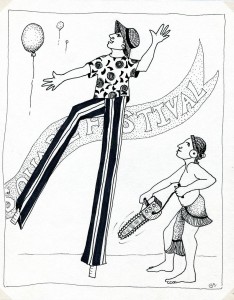
A Gretchen Schaefer illustration for the Maine Times A&E section. The Mayans appeared frequently. Hubley Archives.
What a time that was. Against all evidence, I remain convinced of my coolness and cutting-edginess, but I really had it bad back then. During the Boarders’ first year, I was features editor at Maine Times — running out of steam by the time I got there, but still wielding its prestige, and frequently its value, as Maine’s first and foremost alternative newsweekly.
Maine Times editor Peter Cox gave me extraordinary latitude, as long as I made sure to include garden tours in the event listings. It was the best job I ever had. (An added perk was that I got to hire Gretchen as an illustrator for my pages, gratifying for both of us.)
The Boarders were demonstrably cool. Solid original material, well-chosen covers, attractive mix of musical styles, cathartic and funny performances. It was one of those rare periods in life when our endeavors and the circumstances sang in harmony: a band in its sweet spot, a certified hip-and-cool nightspot willing to book us, a burgeoning local arts and music scene.
The logical question at this point is, of course, what could possibly go wrong? Surprisingly, at least as far as the Boarders were concerned, not much did. I only have one regret on that score: that I never recorded our live shows.
I tend to perceive obstacles more than opportunities. I see myself being boxed in by circumstances and restrained from acting, but the truth is that my thinking gets boxed in by habit, laziness, fear, or lack of curiosity or imagination.
So what does this unfortunate mindset have to do with performance recordings, which I had made routinely for years prior to the Boarders? In late 1994, I began recording band rehearsals on a four-track machine in place of a two-track. That was fairly complicated (probably twice as complicated as the two-track) but manageable in a basement.
However, I believed it would not be so manageable in the performance environment. It never occurred to me that I could bring the four-track to a gig but use only two tracks, as I had done for years when I had only two-track machines to work with.
This bright idea, by the way, has occurred to me only now, 20 years too late.
In short, there were expeditious ways to get the job done. I just couldn’t see them.
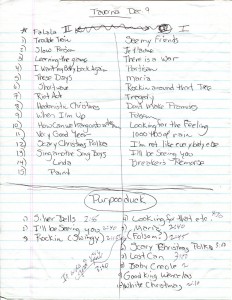
Setlists in Gretchen’s handwriting for holiday gigs at the Taverna and a Rotary Club seniors event at the Purpoodock Club. Hubley Archives.
What was lost? It’s not like our music is irretrievably vanished. I have plenty of rehearsal recordings by the band. But I would love to hear the actual performances on those Taverna nights.
The music with its highs and lows, the way the songs coalesced (or didn’t) into sets, the random details: song intros, jokes on stage and remarks to our friends in the audience, greetings to new arrivals, the guitars being tuned and racket from the bar.
More than anything, it’s those details that create the illusion that the moment lives again, poised to be relived by the people who were there all those years ago.
Of course, the grand subtext of these memoirs is the relationship among experience, memory and document. As I stated in a 2012 post, for me the documents promise to be a supplement and stimulant to memory — but the promise is sometimes broken, as the documents mislead, confuse or simply don’t exist for the memories I hope to recover.
I spent much of that November 2012 post exploring the relationship among experiences, memories and physical proxies thereof. I asked a lot of good questions and produced few good answers. In the year and a half since then, having cleaned out my parents’ house and seen how masses of stuff definitely do not translate into a lifetime of memories, I am more in the dark about this issue than ever.
Maybe an experience is like the big love of your life: You don’t perceive half of what’s happening around you, but the impression feels complete, a world unto itself. And then a memory is like that relationship when your lover is gone. And then a document is just the rebound affair, something to see and touch while you try to get back to the real thing, which of course you’ll never do.
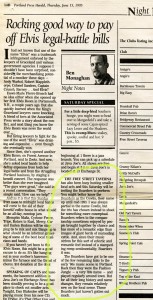
A concise Boarders history lesson thanks to Portland Press Herald columnist Ben Monaghan. Hubley Archives
Hear a collection of Boarders rehearsal recordings from 1994-95.
Tragedy (J. Nichols-Pethick–N. Nichols-Pethick–Hubley) Drummer Jon Nichols-Pethick had previously contributed “All Over” to the Cowlix. His ironic awareness of the details of romantic tension suited the repertoires of that band and even more, the Boarders. He wrote this song with his wife, Nancy, and I added the signature riff and a few lyrics. (But dropped a few lyrics in this rehearsal performance from Dec. 5, 1995: “You say, ‘I need another drink.'”) Note the tribute to “Hill Street Blues” at the end. “Tragedy” copyright © 1995 by Jonathan Nichols-Pethick, Nancy Nichols-Pethick and Douglas L. Hubley. All rights reserved.
Trouble Train (Hubley) There was a sign by the Androscoggin River in Topsham, Maine, warning that operations at the nearby hydroelectric dam could cause the water to rise suddenly. That sign inspired this song, which is less a train song than a collection of metaphors for trouble. This was one of two songs I wrote for the Cowlix; the Boarders’ more ominous treatment befits the theme. “Trouble Train” copyright © 1994 by Douglas L. Hubley. All rights reserved.
All Over (Nichols-Pethick–Hubley) Written by Jon Nichols-Pethick with some tweaks from me, this is a classic country weeper with a great beat. Jonathan actually was inspired to write the song as he gazed at the bottom of a beer glass. Originating with the Cowlix, it later turned up in the repertoire of Scott Link’s band Diesel Doug & the Long-Haul Truckers, appearing on their first CD in a contrasting interpretation. A rehearsal recording from Oct. 15, 1995. “All Over” copyright © 1992 by Jonathan Nichols-Pethick and Douglas L. Hubley. All rights reserved.
Why This Passion (Hubley) A wordy attempt to trace the course of a lovers’ quarrel, this high-romantic epic started out with the Chapman-Torraca Fashion Jungle in an arrangement much too elaborate. Once we reformed the FJ with bassist Dan Knight, I reset “Passion” to a straight beat with the guitar riff heard here. But this version is a further evolution, developed with the Boarders under the influence of Three Mustaphas Three. Drummer Jon Nichols-Pethick plays what we called the “camel beat” and my guitar solo pays homage to Middle Eastern pop radio (as I imagined it). An over-processed rehearsal recording from April 1996. “Why This Passion” copyright © 2010 by Douglas L. Hubley. All rights reserved.
1,000 Pounds of Rain (Hubley) The Boarders in a December 1995 rehearsal recording of a desperate cry of the middle-aged heart, written in spring 1994. Notice the gains in ensemble and intensity over the 1994 version on The Boarders, All Keyed Up. The title came from a Drydock gig for which we were made to carry our equipment up a fire escape in the pouring rain. I liked the title, but it took me four years to figure out what the song should be about. One of the first songs the Boarders learned, it stayed on the playlist all the way through the Howling Turbines. “1,000 Pounds of Rain” copyright © 1995 by Douglas L. Hubley. All rights reserved.
Notes From a Basement text copyright © 2012–14 by Douglas L. Hubley. All rights reserved.
